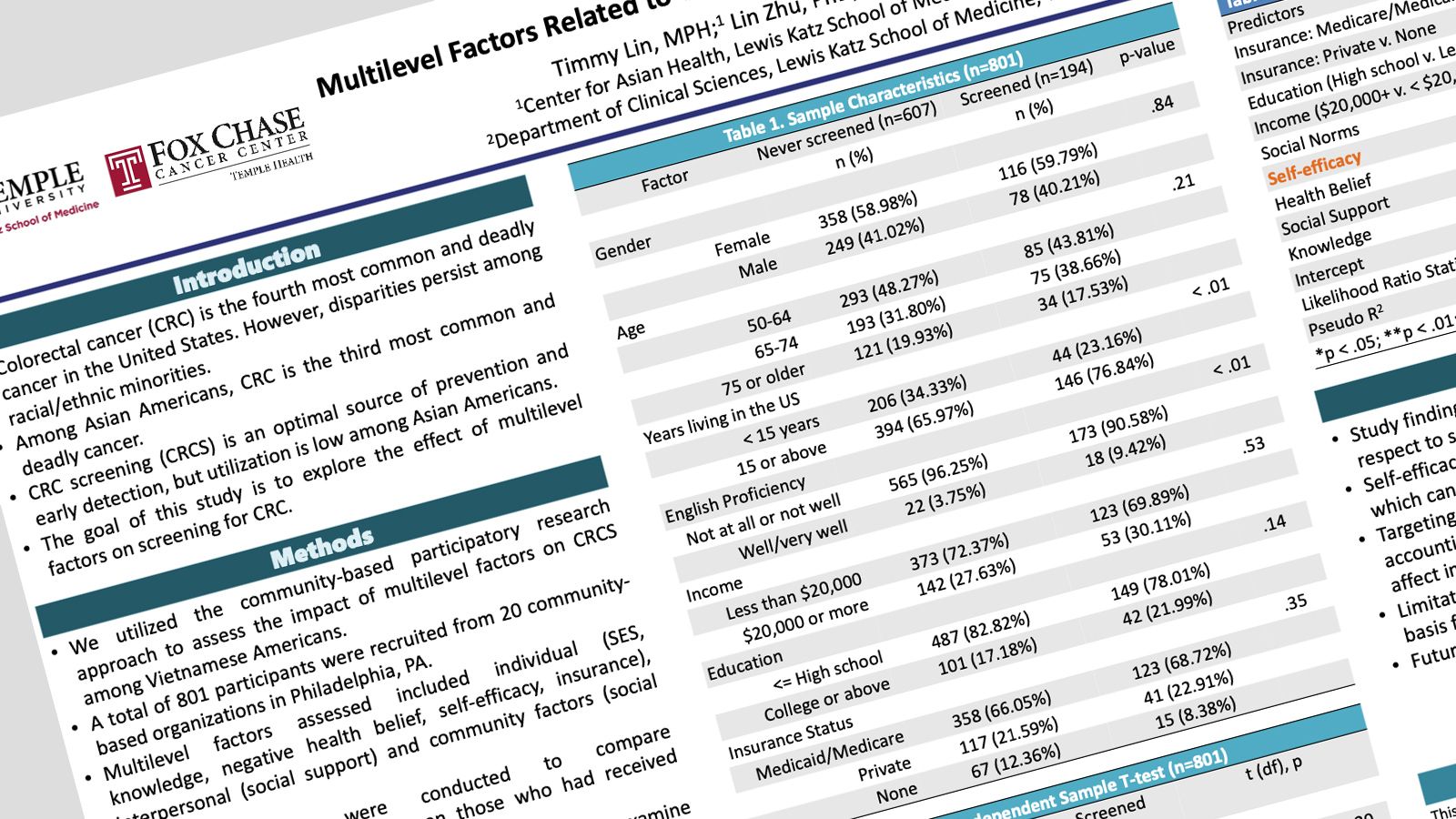
Multilevel Factors Related to Colorectal Cancer Screening Among Vietnamese Americans
| Name | Timmy R. Lin |
| Institution | Temple University |
| Research Field | Population Cancer Research |
| Role at Institution | Graduate Student |
| Presenter(s) | Timmy R. Lin |
Multilevel Factors Related to Colorectal Cancer Screening Among Vietnamese Americans
Timmy Lin, MPH (c)1, Lin Zhu, PhD1, Yin Tan, MPH, MD1, Grace X. Ma, PhD1;2
1Center for Asian Health, Lewis Katz School of Medicine, Temple University, Philadelphia, PA
2Department of Clinical Sciences, Lewis Katz School of Medicine, Temple University, Philadelphia, PA
Background: Colorectal cancer (CRC) is the fourth most common and deadly cancer in the United States. However, disparities persist among racial/ethnic minorities. Among Asian Americans, CRC is the third most common and deadly cancer. CRC screening (CRCS) is an optimal source of prevention and early detection, but utilization is low among Asian Americans. The goal of this study is to explore the effect of multilevel factors on screening for CRC.
Methods: We utilized the community-based participatory research approach to assess the impact of multilevel factors on CRCS among a sample of Vietnamese Americans. A total of 801 participants were recruited from 20 community-based organizations in Philadelphia, PA. Multilevel factors assessed included individual (SES, knowledge, negative health belief, self-efficacy, insurance), interpersonal (social support) and community factors (social norms).
Results: In total, 194 participants reported previously receiving CRCS. Bivariate analysis found significant differences with the number of years living in the U.S., English proficiency and self-efficacy by screening status. Structural equation model results indicated a significant positive relationship between self-efficacy and CRCS (coefficient=0.092, z=2.98, p<.001). There was a significant negative relationship between self-efficacy and negative health belief (coefficient=-0.03, z=-2.42, p<.05). Additionally, there were significant negative relationships between negative health belief and SES (coefficient=-0.8, z=-3.16, p<.01), social support (coefficient=-0.36, z=-3.33, p<.001) as well as social norms (coefficient=-0.18, z=-2.75, p<.01).
Conclusion: Study findings demonstrated the direct and indirect role of multilevel factors on screening behaviors. Targeting multilevel factors could be beneficial in improving CRCS by accounting for interpersonal and community-level factors that could affect individual screening behaviors.
Acknowledgement: This research project was supported by grant U01MD010627 (PI: Grace X. Ma, PhD) funded by National Institute on Minority Health and Health Disparities (NIMHD) of National Institute of Health (NIH), and partially supported by the grant of U54 CA221704(5) funded by the National Cancer Institute (NCI) of NIH (Contact PIs: Grace X. Ma, PhD and Olorunseun O. Ogunwobi, MD, PhD). The contents of this abstract are solely the responsibility of the authors and do not necessarily represent the official views of NIMHD or the NCI, NIH.
Email questions and comments about this abstract to timmy.r.lin@gmail.com.
